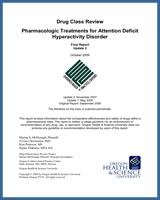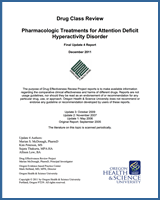NCBI Bookshelf. A service of the National Library of Medicine, National Institutes of Health.
McDonagh MS, Christensen V, Peterson K, et al. Drug Class Review: Pharmacologic Treatments for Attention Deficit Hyperactivity Disorder: Final Report Update 3 [Internet]. Portland (OR): Oregon Health & Science University; 2009 Oct.
This publication is provided for historical reference only and the information may be out of date.

Drug Class Review: Pharmacologic Treatments for Attention Deficit Hyperactivity Disorder: Final Report Update 3 [Internet].
Show details| Trade name | Active ingredient(s) | Boxed warnings |
|---|---|---|
| Adderall® | Amphetamine mixture (amphetamine aspartate; amphetamine sulphate; dextroamphetamine saccharate; dextroamphetamine sulfate) | Amphetamines have a high potential for abuse. Administration of amphetamines for prolonged periods of time may lead to drug dependence and must be avoided. Particular attention should be paid to the possibility of subjects obtaining amphetamines for nontherapeutic use or distribution to others and the drugs should be prescribed or dispensed sparingly. Misuse of amphetamine may cause sudden death and serious cardiovascular events. |
| Dexedrine®, Dexedrine Spansule® | Dextroamphetamine sulfate | |
| Adderall® XR | Amphetamine mixture (amphetamine aspartate; amphetamine sulphate; dextroamphetamine saccharate; dextroamphetamine sulfate) | Amphetamines have a high potential for abuse. Administration of amphetamines for prolonged periods of time may lead to drug dependence. Particular attention should be paid to the possibility of subjects obtaining amphetamines for nontherapeutic use or distribution to others and the drugs should be prescribed or dispensed sparingly. Misuse of amphetamine may cause sudden death and serious cardiovascular events. |
| Vyvanse® | Lisdexamfetamine dimesylate | |
| Concerta® | Methylphenidate hydrochloride | Drug dependence: These drugs should be given cautiously to patients with a history of drug dependence or alcoholism. Chronic abusive use can lead to marked tolerance and psychological dependence with varying degrees of abnormal behavior. Frank psychotic episodes can occur, especially with parenteral abuse. Careful supervision is required during withdrawal from abusive use since severe depression may occur. Withdrawal following chronic therapeutic use may unmask symptoms of the underlying disorder that may require follow-up. |
| Daytrana® | Methylphenidate hydrochloride | |
| Focalin® and Focalin® XR | Dexmethylphenidate hydrochloride | |
| Metadate® CD | Methylphenidate hydrochloride | |
| Ritalin®, Ritalin® SR, Ritalin® LA | Methylphenidate hydrochloride | |
| Desoxyn® | Methamphetamine hydrochloride | Methamphetamine has a high potential for abuse. It should be tried only in weight reduction programs for patients in whom alternative therapy has been ineffective. Administration of methamphetamine for prolonged periods of time in obesity may lead to drug dependence and must be avoided. Particular attention should be paid to the possibility of subjects obtaining methamphetamine for non-therapeutic use or distribution to others, and the drugs should be prescribed or dispensed sparingly. Misuse of methamphetamine may cause sudden death and may lead to serious cardiovascular events. |
| Methylin® | Methylphenidate hydrochloride | Drug abuse and dependence: Methylin® should be given cautiously to emotionally unstable patients, such as those with a history of drug dependence or alcoholism, because such patients may increase dosage on their own initiative. Chronically abusive use can lead to marked tolerance and psychic dependence with varying degrees of abnormal behavior. Frank psychotic episodes can occur, especially with parenteral abuse. Careful supervision is required during drug withdrawal, since severe depression as well as the effects of chronic overactivity can be unmasked. Long- term follow-up may be required because of the patient’s basic personality disturbances. |
| Metadate® ER | Methylphenidate hydrochloride | |
| Strattera® | Atomoxetine HCL | WARNING: SUICIDAL IDEATION IN CHILDREN AND ADOLESCENTS Strattera® (atomoxetine) increased the risk of suicidal ideation in short-term studies in children or adolescents with Attention-Deficit/Hyperactivity Disorder (ADHD). Anyone considering the use of Strattera® in a child or adolescent must balance this risk with the clinical need. Co- morbidities occurring with ADHD may be associated with an increase in the risk of suicidal ideation and/or behavior. Patients who are started on therapy should be monitored closely for suicidality (suicidal thinking and behavior), clinical worsening, or unusual changes in behavior. Families and caregivers should be advised of the need for close observation and communication with the prescriber. Strattera® is approved for ADHD in pediatric and adult patients. Strattera® is not approved for major depressive disorder. Pooled analyses of short-term (6 to 18 weeks) placebo- controlled trials of Strattera® in children and adolescents (a total of 12 trials involving over 2200 patients, including 11 trials in ADHD and 1 trial in enuresis) have revealed a greater risk of suicidal ideation early during treatment in those receiving Strattera® compared to placebo. The average risk of suicidal ideation in patients receiving Strattera® was 0.4% (5/1357 patients), compared to none in placebo-treated patients (851 patients). No suicides occurred in these trials. |
- Black box warnings of ADHD drugs approved by the US Food and Drug Administration...Black box warnings of ADHD drugs approved by the US Food and Drug Administration - Drug Class Review: Pharmacologic Treatments for Attention Deficit Hyperactivity Disorder
Your browsing activity is empty.
Activity recording is turned off.
See more...
